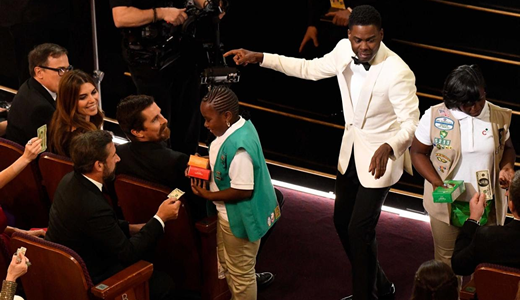About midway through Sunday’s Oscar telecast on ABC, host Chris Rock brought out his daughters’ Girl Scout troop and had them sell cookies to Hollywood’s A-listers. “Leo, you made $30 million—come on!” Rock hollered in the direction of Leonardo DiCaprio.
By the time he tallied the troop’s earnings for the evening—somewhere north of $65,000—I was munching on my own stash of Thin Mints. And, since I was live-tweeting the Oscars, I guiltily confessed as much.
“So … you’re saying our entertainment choices really DO influence how we live …?” tweeted back Antilles58.
On Hollywood’s biggest night, the entertainment industry did its best to influence how we live, how we think and what we care for. Even though the evening was ostensibly to honor the art of moviemaking, this was a night in which issues took center stage and commanded it almost all evening.
All due respect to DiCaprio, Spotlight and Mad Max: Fury Road, the #OscarsSoWhite controversy was the evening’s biggest star. Rock found a way to discuss the issue pointedly and repeatedly—and with lots and lots of yuks. Rock’s monologue and a handful of pre-produced segments skewered Oscar repeatedly for its lack of inclusivity, and a number of presenters made mention of it as well. Even the Academy’s president, Cheryl Boone Isaacs, showed up to perform a bit of a mea culpa.
“Our audiences are global and rich in diversity,” she said, “and every facet of our industry should be as well.”
But societal and global concerns didn’t stop there. Many people who gave awards, and nearly everyone who received one, had something weighty to say.
Vice President Joe Biden and Lady Gaga teamed up for perhaps the most emotional segment of the night, drawing attention to sexual abuse perpetrated against both men and women. Sam Smith, when he collected an Oscar for Best Song (“The Writing’s on the Wall,” from Spectre), dedicated the honor to the worldwide LGBT community. Jenny Beavan, who grabbed an Oscar for Costume Design for her work on Fury Road, concluded her speech with this: “I just want to say one quite serious thing, I’ve been thinking about this a lot, but actually it could be horribly prophetic, Mad Max, if we’re not kinder to each other, and if we don’t stop polluting our atmosphere, so you know, it could happen.”
She wasn’t the only one who was thinking of the environment Sunday night. Most of DiCaprio’s acceptance speech was focused on climate change. He said:
Making The Revenant was about man’s relationship to the natural world. A world that we collectively felt in 2015 as the hottest year in recorded history. Our production needed to move to the southern tip of this planet just to be able to find snow. Climate change is real, it is happening right now. It is the most urgent threat facing our entire species, and we need to work collectively together and stop procrastinating.
The Oscars telecast—ostensibly an entertainment show about the entertainment industry—was more interested this year in inspiring or shaming or calling its viewers to action than it was in, well, entertaining. Nothing inherently wrong with the idea of this, of course. In fact, it’s right along the lines of what Plugged In has preached for more than 20 years: movies matter. Each #OscarsSoWhite rib, each advocacy speech, was an effort to either change or further societal dialogue—an effort to influence our thoughts and feelings and, if possible, actions.
And we’re not just talking about the messages in the Oscar ceremony. It extends, in many cases, to the movies themselves. Consider Spotlight, the year’s Best Picture, according to Oscar. The movie chronicles The Boston Globe’s coverage of the Catholic priest pedophilia scandal, which broke in 2002. This wasn’t a movie meant to “entertain,” but to convict. “This film gave a voice to survivors, and this Oscar amplifies that voice, which we hope will become a choir that will resonate all the way to the Vatican,” producer Michael Sugar said in his acceptance speech. “Pope Francis, it’s time to protect the children and restore the faith.”
Or there’s The Big Short, a movie that takes on the housing crisis of 2007. “If you don’t want big money to control government, don’t vote for candidates that take money from big banks, oil, or weirdo billionaires,” said director Adam McKay in accepting an Oscar for Best Adapted Screenplay.
These movies are meant to move us not to just laugh or cry, but to do something different in the world at large. Movies matter, we were told Sunday night. They impact the way we think and feel. They have the power to change the world.
It’s always ironic that entertainment moguls believe movies matter in the ways in which they want them to matter, but often pooh-pooh any negative influence they might have. Never mind how these films may influence our sexual mores, our predilections for violence or our ever coarsening culture. This is their idea: The Big Short will teach us all to mistrust big banks, and everyone who watches it surely won’t be impacted by its 100 f-words or dog-eat-dog worldview. And when organizations like Plugged In point out some potentially causal links between problematic entertainment content and the world around us, we’re subject to eye rolls. Perhaps, ironically, a profanity-laden email or two.
And yet, those links are there—even if we wish they weren’t. Movies can influence us for better and worse, and sometimes in ways we’re barely aware of. Celebrities can sway us in myriad ways, even when we insist that they don’t. The media we see and hear and feel matters. It impacts us in areas both big and small.
My Thin Mints can attest to that.






Recent Comments